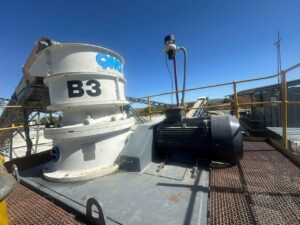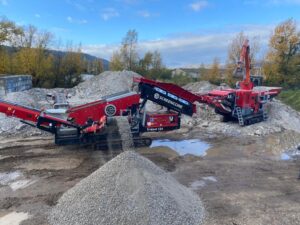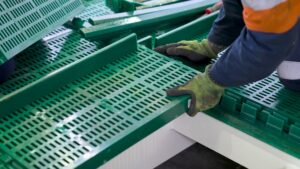In a landmark project that promises to transform the experience of passing through the Beitbridge border between South Africa and Zimbabwe, leading contractor Raubex is well advanced in constructing three new immigration facilities. The cement for the project’s 125 000 m² of roads and parking area is coming from AfriSam’s Roodepoort plant, 550 km to the south.
When completed, the facility will provide three new immigration facilities, each custom designed to speed up the flow of traffic, according to Raubex construction manager Herkie Sandenbergh. The first area, dedicated to freight trucks, has already been handed over, and processes approximately 500 trucks a day. Currently underway is the second phase which is focused on bus transport, which will be complete by May 2022. The third phase will be the facility for light traffic and will be handed over in November this year.
“Each stream will have its own terminal building where all customs and immigration documentation will be dealt with, thereby streamlining the processes by applying specific expertise in each area,” says Sandenbergh.
He adds that there is considerable related infrastructure around the town of Beitbridge that is also included in the scope of work. This includes an 11,5 million litre reservoir with associated pipelines, an oxidation dam for sewage treatment, a fire station, an animal quarantine facility and a new staff village for border post personnel.
As a key partner in the project, AfriSam has supplied some 7 000 tonnes of its High Strength R42.5 cement from its Roodepoort plant near Johannesburg. The company will have delivered around 10 000 tonnes of bulk cement by the time work is completed – delivered in 34 tonne tankers.
Adele Wentzel, AfriSam’s sales manager manufacturing for Gauteng, says the distance from site and the complexities of border crossings have been among the challenges to be overcome.
“The AfriSam team has been working closely to ensure consistent quality and on-time delivery, while complying with the various customs requirements at the border,” says Wentzel. “Our close coordination – combined with daily interactions with site – have kept the project proceeding well.”
She notes that congestion at the border – which delayed trucks for up to a week – was a particular challenge in the early stages.
“Our success to date has certainly built constructively on our long relationship with Raubex,” she says.






